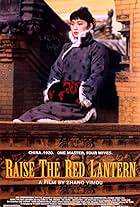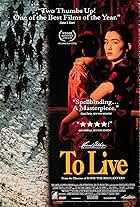IMDb RATING
7.6/10
9.2K
YOUR RATING
In rural China, the young bride of a tyrannical owner of a silk-dyeing business finds temporary solace in the arms of her husband's nephew, but problems arise when she becomes pregnant.In rural China, the young bride of a tyrannical owner of a silk-dyeing business finds temporary solace in the arms of her husband's nephew, but problems arise when she becomes pregnant.In rural China, the young bride of a tyrannical owner of a silk-dyeing business finds temporary solace in the arms of her husband's nephew, but problems arise when she becomes pregnant.
- Nominated for 1 Oscar
- 8 wins & 6 nominations total
- Directors
- Writer
- All cast & crew
- Production, box office & more at IMDbPro
Storyline
Did you know
- TriviaIn the original novel Tianqing is the biological nephew of Jinshan and the story itself is about incest by affinity. The makers of the film version decided not to use the incest angle, so in the film Tianqing and Jinshan are not biologically related.
Featured review
The title character, a peasant sold as a concubine to a cruel old man, is played by the beautiful Gong Li, one of the great actresses of our time who followed this brilliant work with spectacular performances in The Story of Qiu Ju (1991), Raise the Red Lantern (1992), and Farewell, My Concubine (1993). Li Wei plays her master, Yang Jin-shan, the childless owner of a dye mill in the agrarian China of the 1920s. Li Wei's fine performance combines craftiness with iniquity reminding me a little of the late great John Huston with scruffy beard. The third character in the tragic triangle is Jin-shan's nephew, Yang Tianqing, a modest man who does most of the work in the dye mill. The pent-up intensity of Li Baotian, who plays Tianqing, recalled to me at times the work of Ben Kingsley. Ju Dou falls in love with Tianqing almost by default, and it is their ill-fated love that leads to tragedy.
In some ways this visually stunning, psychologically brutal film about paternity and the old social order of China was Director Zhang Yimou's "practice" for the making two years later of his masterpiece, the afore mentioned, Raise the Red Lantern, one the greatest films ever made. The theme of patriarchal privilege is similar, and in both films Gong Li portrays a young concubine required to bear a son and heir to a cruel and ageing man of means. Even though the setting in both films is China in the twenties before the rise of Communism, both films very much annoyed the ageing leadership of Communist China and were censured (Ju Dou was actually banned), ostensibly for moral reasons, but more obviously because of the way they depicted elderly men in positions of power.
Ju Dou is the lesser film only in the sense that Sirius might outshine the sun were the two stars placed side by side. Both films are masterpieces, but for me Ju Dou was difficult to watch because of the overt cruelty of the master, whereas in Raise the Red Lantern, Yimou chose to keep the more brutal aspects of the story off camera. In a sense, then, Raise the Red Lantern is the more subtle film. It is also a film of greater scope involving more characters, infused with an underlining sense of something close to black humor. (The very lighting of the lanterns was slyly amusing as it ironically pointed to the subjugation.)
In Ju Dou there is virtually no humor and the emphasis is on the physical brutality of life under the patriarchal social order. Ju Dou is beaten and tortured while we learn that Jin-shan tortured his previous wives to death because of their failure to bear him an heir. The terrible irony is that it is Jin-shan who is sterile. He feels shamed in the eyes of his ancestors because the Wang line will die out with him. But a child is finally born through Ju Dou's illicit affair with Tianqing. (Note that this conjoining in effect saves Ju Dou's life.) Jin-shan thinks the infant is his son and briefly all is serenity. However, while two may live happily ever after, three will not. Notice too that now that Jin-shan has an heir, nephew Tianqing will inherit nothing.
Will they kill Jin-shan? Will fortuitous events put him out of the picture?
Will they find happiness? Will the boy learn the truth about his paternity? Yimou's artistry does not allow superficial resolution, you can be sure.
Note the two significant turns the film takes early on. One comes after Ju Dou discovers that Tianqing has been spying on her through a peep hole as she goes about her bath. At first she is mortified, and then sees this as a chance to show him the scars from the torture she endures daily, and then she shows him her body to allure him. The other turn comes as the child pronounces his first words by calling the old man "Daddy." Instantly Jin-shan, now confined to a wooden bucket that serves as a wheelchair, divines a deep psychological plan to realize his revenge. He embraces the child as his own, hoping to turn the boy against the illicit couple.
The strength of the film is in the fine acting, the beautiful sets, the gorgeous camera work, and in the unsentimental story that does not compromise or cater to saccharin or simplistic expectations. Yimou is a visual master who turns the wood gear- and donkey-driven dye mill of the 1920s into a tapestry of brilliant color and texture. Notable is the fine work that he does with the two boys who play the son at different ages. He has them remain virtually mute throughout and almost autistically cold. Indeed part of the power of this film comes from the depiction of the character of the son who grows up to hate who he is and acts out his hatred in murderous violence toward those around him.
Zhang Yimou is one of the few directors who can bring simultaneously to the silver screen the power of an epic and the subtlety of a character study. His films are more beautiful than the most lavish Hollywood productions and as artistically satisfying as the best in world cinema. The only weakness in the film is perhaps the ending which is played like a Greek tragedy for cathartic effect. One senses that Yimou and co-director Yang Fengliang in choosing the terminus were not entirely sure how this tale should end and took what might be seen as an easy way out.
(Note: Over 500 of my movie reviews are now available in my book "Cut to the Chaise Lounge or I Can't Believe I Swallowed the Remote!" Get it at Amazon!)
In some ways this visually stunning, psychologically brutal film about paternity and the old social order of China was Director Zhang Yimou's "practice" for the making two years later of his masterpiece, the afore mentioned, Raise the Red Lantern, one the greatest films ever made. The theme of patriarchal privilege is similar, and in both films Gong Li portrays a young concubine required to bear a son and heir to a cruel and ageing man of means. Even though the setting in both films is China in the twenties before the rise of Communism, both films very much annoyed the ageing leadership of Communist China and were censured (Ju Dou was actually banned), ostensibly for moral reasons, but more obviously because of the way they depicted elderly men in positions of power.
Ju Dou is the lesser film only in the sense that Sirius might outshine the sun were the two stars placed side by side. Both films are masterpieces, but for me Ju Dou was difficult to watch because of the overt cruelty of the master, whereas in Raise the Red Lantern, Yimou chose to keep the more brutal aspects of the story off camera. In a sense, then, Raise the Red Lantern is the more subtle film. It is also a film of greater scope involving more characters, infused with an underlining sense of something close to black humor. (The very lighting of the lanterns was slyly amusing as it ironically pointed to the subjugation.)
In Ju Dou there is virtually no humor and the emphasis is on the physical brutality of life under the patriarchal social order. Ju Dou is beaten and tortured while we learn that Jin-shan tortured his previous wives to death because of their failure to bear him an heir. The terrible irony is that it is Jin-shan who is sterile. He feels shamed in the eyes of his ancestors because the Wang line will die out with him. But a child is finally born through Ju Dou's illicit affair with Tianqing. (Note that this conjoining in effect saves Ju Dou's life.) Jin-shan thinks the infant is his son and briefly all is serenity. However, while two may live happily ever after, three will not. Notice too that now that Jin-shan has an heir, nephew Tianqing will inherit nothing.
Will they kill Jin-shan? Will fortuitous events put him out of the picture?
Will they find happiness? Will the boy learn the truth about his paternity? Yimou's artistry does not allow superficial resolution, you can be sure.
Note the two significant turns the film takes early on. One comes after Ju Dou discovers that Tianqing has been spying on her through a peep hole as she goes about her bath. At first she is mortified, and then sees this as a chance to show him the scars from the torture she endures daily, and then she shows him her body to allure him. The other turn comes as the child pronounces his first words by calling the old man "Daddy." Instantly Jin-shan, now confined to a wooden bucket that serves as a wheelchair, divines a deep psychological plan to realize his revenge. He embraces the child as his own, hoping to turn the boy against the illicit couple.
The strength of the film is in the fine acting, the beautiful sets, the gorgeous camera work, and in the unsentimental story that does not compromise or cater to saccharin or simplistic expectations. Yimou is a visual master who turns the wood gear- and donkey-driven dye mill of the 1920s into a tapestry of brilliant color and texture. Notable is the fine work that he does with the two boys who play the son at different ages. He has them remain virtually mute throughout and almost autistically cold. Indeed part of the power of this film comes from the depiction of the character of the son who grows up to hate who he is and acts out his hatred in murderous violence toward those around him.
Zhang Yimou is one of the few directors who can bring simultaneously to the silver screen the power of an epic and the subtlety of a character study. His films are more beautiful than the most lavish Hollywood productions and as artistically satisfying as the best in world cinema. The only weakness in the film is perhaps the ending which is played like a Greek tragedy for cathartic effect. One senses that Yimou and co-director Yang Fengliang in choosing the terminus were not entirely sure how this tale should end and took what might be seen as an easy way out.
(Note: Over 500 of my movie reviews are now available in my book "Cut to the Chaise Lounge or I Can't Believe I Swallowed the Remote!" Get it at Amazon!)
- DennisLittrell
- Dec 28, 2002
- Permalink
- How long is Ju Dou?Powered by Alexa
Details
Box office
- Gross US & Canada
- $1,986,433
- Opening weekend US & Canada
- $10,300
- Mar 10, 1991
- Gross worldwide
- $1,986,433
Contribute to this page
Suggest an edit or add missing content
























